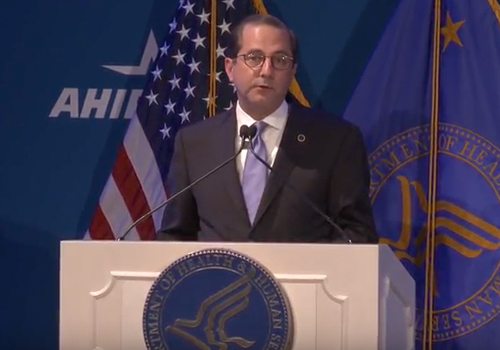
HHS Says Expanding Value Based Care a Top Priority
The federal government says it will double down on value based care models in its effort to transform payment models, especially new innovative forms of coordinated care led by the Center for Medicare and Medicaid Innovation.
In three separate speeches before healthcare leaders since March, newly appointed Health and Human Services (HHS) Secretary Alex Azar placed value based care innovation on the top of his list of priorities. Value based care models seek to reward providers for improved outcomes through better coordination of care and quality instead of reimbursing only for the quantity of services provided.
“There is no turning back to an unsustainable system that pays for procedures rather than value,” said Secretary Azar before the Federation of American Hospitals. “In fact, the only option is to charge forward, for HHS to take bolder action, and for providers and payers to join with us.”
The announcement is welcome news to Fresenius Medical Care North America, which is leading the shift to value based care for chronically ill patients. The company currently coordinates care for almost 50,000 patients with end stage renal disease through its value based care programs. The results have shown improved outcomes for patients, including a 30 percent drop in hospitalizations in some of those programs, and millions of dollars in savings for the government.
“We know firsthand that value based care can deliver enormous savings while at the same time improving the lives of our patients,” said William McKinney, president of FMCNA’s Integrated Care Group, which currently operates value based care programs for dialysis patients. “With this commitment from HHS and Secretary Azar we hope to accelerate the growth of these innovative programs, allowing us to ensure access to quality care for patients beyond the walls of the dialysis unit.”
At the same time, Congress is also considering a bill that would create a much larger value based network for dialysis patients. The Dialysis PATIENTS Demonstration Act would establish an integrated care program in which interdisciplinary teams, led by a nephrologist, provide holistic healthcare management for this vulnerable patient population. It combines the best of the current value based models under the Centers for Medicare and Medicaid Services.
“We have been very encouraged to see growing bi-partisan support for this effort among members of the House and Senate,” said Cameron Lynch, senior vice president for government affairs at Fresenius Medical Care North America. “The PATIENTS Act will help modernize and improve the way we care for patients with kidney failure.”
Even without passage of the PATIENTS Act, it’s clear that HHS has big goals for the growth and impact of value based care. Secretary Azar has repeatedly pointed out that escalating healthcare costs are not sustainable and new disruptive models must be encouraged.
Secretary Azar outlined four areas of emphasis to achieve his goals: giving consumers more control over their health information; improving transparency from providers and payers; expanding alternative payment models focused on value and quality; and eliminating government burdens that impede this value based transformation.
“I don’t intend to spend the next several years tinkering,” said Secretary Azar. “We want to look at bold measures that will fundamentally reorient how Medicare and Medicaid pay for care and create a true competitive playing field where value is rewarded handsomely.”
Learn more about value based care and its impact on patients in a Q&A with Dr. Frank Maddux, chief medical officer for FMCNA, and Dr. Andy Howard, a nephrologist with Fresenius Health Partners.


